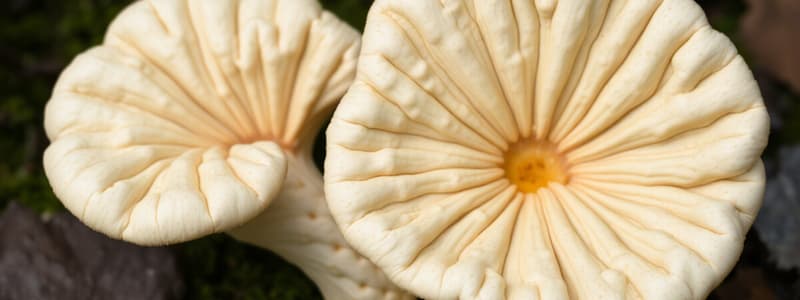Podcast
Questions and Answers
What is the primary method of sexual reproduction in Basidiomycetes?
What is the primary method of sexual reproduction in Basidiomycetes?
- Budding
- Plasmogamy followed by karyogamy and meiosis (correct)
- Binary fission
- Fragmentation
Which of the following statements about Deuteromycetes is correct?
Which of the following statements about Deuteromycetes is correct?
- They were originally classified based on their sexual reproductive forms.
- They exclusively decompose organic material.
- They are known as imperfect fungi due to their unobserved sexual stages. (correct)
- They are exclusively sexual fungi.
Basidiospores are produced on which structure in Basidiomycetes?
Basidiospores are produced on which structure in Basidiomycetes?
- Stipes
- Hyphal tips
- Mycelium
- Basidium (correct)
Which characteristic is NOT true for Basidiomycetes?
Which characteristic is NOT true for Basidiomycetes?
The common habitat for Basidiomycetes includes which of the following?
The common habitat for Basidiomycetes includes which of the following?
Flashcards
Basidiomycetes
Basidiomycetes
A group of fungi commonly known as mushrooms, bracket fungi, and puffballs, frequently found in soil, on logs, and tree stumps.
Basidiocarp
Basidiocarp
The fruiting body of a basidiomycete fungus, containing and arranging basidia (singular: basidium).
Asexual reproduction
Asexual reproduction
The asexual phase of fungal reproduction, where a single cell produces new spores.
Sexual reproduction
Sexual reproduction
Signup and view all the flashcards
Deuteromycetes (Imperfect Fungi)
Deuteromycetes (Imperfect Fungi)
Signup and view all the flashcards
Study Notes
Basidiomycetes
- Commonly known as mushrooms, bracket fungi, or puffballs
- Grow in soil, on logs, and tree stumps
- Mycelium is branched and septate
- Asexual reproduction is typically absent
- Reproduction by fragmentation is common
- Sex organs are absent
- Plasmogamy brings about fusion of two vegetative or somatic cells
- Resultant structure is dikaryotic
- Karyogamy and meiosis occur in the basidium
- Basidiospores are produced on the basidium (pl.: basidia)
- Basidia are arranged in fruiting bodies called basidiocarps
- Common members include Agaricus (mushroom), Ustilago (smut), and Puccinia (rust fungus)
Deuteromycetes
- Commonly known as imperfect fungi
- Only the asexual or vegetative phases are known
- When sexual forms are discovered, they're moved into other classes
- Later, when linkages are established, they are correctly identified
- Sometimes moved to ascomycete or basidiomycete classes
- Reproduce only through asexual spores (conidia)
- Mycelium is septate and branched
- Some are saprophytes or parasites
- Help in mineral cycling
- Examples include Alternaria, Colletotrichum, and Trichoderma
Ascomycetes
- Some members are known as morels and truffles (edible)
- Sexual spores are called ascospores
- Spores produced endogenously in sac-like asci (singular ascus)
- Asci are arranged in fruiting bodies called ascocarps
- Examples: Aspergillus, Claviceps, and Neurospora are used in biochemical and genetic works
Studying That Suits You
Use AI to generate personalized quizzes and flashcards to suit your learning preferences.



